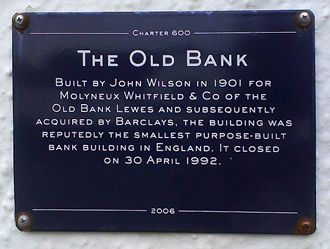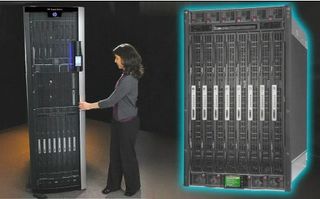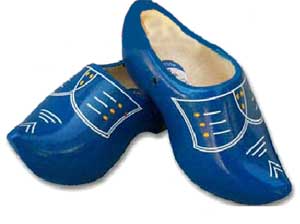 IT services outfit DXC Technology and financial product and pricing control company Zafin
IT services outfit DXC Technology and financial product and pricing control company Zafin
Tag: bank
HP locks in corporate customers
 Ahead of the breakup of the company, HP is doing its best to make sure that its big corporate customers do not flee.
Ahead of the breakup of the company, HP is doing its best to make sure that its big corporate customers do not flee.
The maker of expensive printer ink has announced a cunning plan to help retain important customers by allowing them to leave behind their Integrity.
HP will offer versions of two computer server lines under H-P’s Integrity moniker—Superdome and NonStop—that will be powered by Intel’s Xeon chips. HP’s Integrity machines now use Intel’s Itanium chips.
HP’s new Superdome model has sockets to plug in 16 Xeon chips and offers nine times the performance of a conventional H-P system with eight Xeon chips, the company said. H-P has developed accessory chips and software to speed up communications between chips and improve reliability.
Revenue from these “business-critical” servers, declined 29 percent in the quarter ended in October over a year earlier. However, Superdome and NonStop servers are still used by banks, telecommunications carriers and other companies particularly concerned with reliability.
Integrity only made $929 million in revenue in the fiscal year ended October 31, which was nothing compared to the $12.5 billion generated from more popular x86 servers.
HP needs to keep these customers sweet because they buy software, services and other hardware from H-P that hinges on the applications running on the Superdome and NonStop machines.
Under the plan HP will keep developing Itanium-based systems but will help its clients move Intel’s mainstream Xeon technology.
Intel, which introduced its last Itanium model in late 2012, has disclosed plans for a successor, which is code-named Kittson. The chipmaker hasn’t said when that product will arrive nor described models it may develop after that.
For Superdome, HP is encouraging customers to move to the Linux operating system or other software. HP is porting NonStop software to run on Xeon chips. The company is offering services to help customers migrate to the new technology in both cases.
IBM goes Dutch on big cloud contract
 Beleaguered Big Blue has signed a 10-year, multi-billion dollar deal to provide computer infrastructure services to Dutch bank Amro.
Beleaguered Big Blue has signed a 10-year, multi-billion dollar deal to provide computer infrastructure services to Dutch bank Amro.
Amro thinks that the men in suits are exactly the sorts of types it wants running its cloud operations. However it is a case of “better the devil you know”. IBM has been running Amro’s computer services for a while now.
Under the first €1.5bn deal in 2005, 1,500 people in IT lost their jobs when the bank outsourced most of its IT to the global outsourcing arm of IBM.
At the time, IBM took over the management of the datacentres for the bank’s commercial and consumer clients, private clients, asset management, and new growth markets.
IBM has had some difficulty attracting much interest in its internet-delivered services, as it seems a bit outclassed by the likes of Oracle, Microsoft and Amazon.
IBM will provide fully managed services for mainframe computers, servers, storage and end-user computing as well as a help desk and other technical support. IBM did not disclose financial details of the deal.
Actually it has been a good few weeks for IBM. It recently won a 7-year outsourcing contract from Germany’s Lufthansa worth $1.25 billion that will see the U.S. company take over the airline’s information technology infrastructure services division and staff.
Zalman loses its cool over dodgy deals
 Cooling product company Zalman has gone bankrupt following the discovery of some somewhat unorthodox actions by its CEO and vice presidents.
Cooling product company Zalman has gone bankrupt following the discovery of some somewhat unorthodox actions by its CEO and vice presidents.
The South Korean company was thought to be doing well, as its products were under the bonnet of rather a lot of PCs.
The reason for its bankruptcy is not anything to do with its own products or performance, in fact this news shocked Zalman employees. What appears to have happened is that the company has collapsed is due to the actions of its parent company Moneual, and its CEO and vice presidents.
Moneual CEO Harold Park, and vice presidents Scott Park and Won Duck-yeok, have, or so it is alleged, spent the last five years producing fraudulent documentation relating to the sales performance of Zalman.
They had been giving inflated sales figures and export data for Zalman’s products to get loans from the bank, it’s alleged.
By increasing sales and exports, Park and his associates were able to secure bank loans totalling $2.98 billion, it’s alleged.
According to The Korea Times, Moneual failed to repay its huge export bonds that matured on October 20, 2014, and filed for bankruptcy. Zalman’s stock price also began a quick downfall. However, the numbers just do not add up – Moneual has been repeatedly reporting major profits, with their 2013 annual report being nearly 1.2 billion dollars in sales and over 100 million dollars in profit. Regulators investigated and it appears that there was evidence of a well-designed corporate fraud.
Moneual allegedly acquired Zalman in 2011 as part of the fraud. They are said to have forged Zalman’s export and accounting documents, greatly overstating their export and income reports, in order to become eligible for huge bank loans. The employees knew that the company was a sham but, despite the unearthly profit reports of the past few years, no government officials noticed.
Moneual received about $620 million in loans from several Korean banks and another 275 million dollars as export credit from the Korea Trade Insurance Corp, making the owners of Moneual richer by nearly $900 million.
The company’s owners have been arrested and, alongside many top and mid-level executives of the company, are now facing prison if convicted of the charges. However Harold Park has US citizenship and his brother has Canadian, and there’s some concerns that Korean law could face trouble prosecuting them.
No one expects Zalman to survive. The company does hold a number of patents relating to cooling and fan noise reduction technology and it seems likely a patent sale will happen eventually. However, these are unlikely to be worth $3 billion.
Drug czar thinks coke loving bankers caused financial crash
 The 2008 financial crash was caused by overleveraged banks, the collapse of the US housing market and a range of other factors. One of those factors might have been cocaine, which is rather popular in banking circles, or so we are told.
The 2008 financial crash was caused by overleveraged banks, the collapse of the US housing market and a range of other factors. One of those factors might have been cocaine, which is rather popular in banking circles, or so we are told.
Professor David Nutt, the former government drugs czar who lost his job after he famously stated that taking an ecstasy tablet was as safe as riding a horse, believes cocaine contributed to the crash and also led to the 1995 collapse of Barings bank.
Nutt believes cocaine helped take bankers over the edge, as cocaine users tend to be overconfident and take more risks. It can also make people quite boring at parties.
“Bankers use cocaine and got us into this terrible mess. It is a “more” drug;” he told the Sunday Times. He added that cocaine is well suited for the culture of excitement and drive, which is prevalent in the banking world.
On the other hand, who would you rather leave in charge of your personal finances? An alcoholic, a pothead, or an overly confident coked-up loudmouth with a Scarface fetish?





